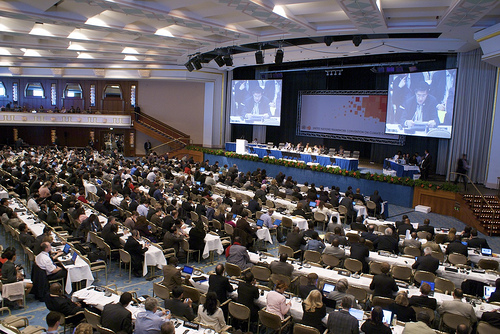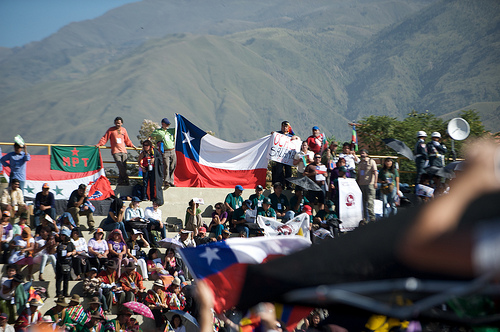Podcast: Play in new window | Download
- Pastors For Peace, Reverend Lucius Walker Jr. In Memoriam
- Justice Bybee Dissent Contradicts His Own Legal Reasoning To Allow US Torture
—–
People’s Council on Climate Justice
From climate change to man made disasters such as the BP oil catastrophe, the People’s Council on Climate Justice are pushing for a structure of accountability. In April, the People’s World Conference on Climate Change and the Rights of Mother Earth in Cochabamba, Bolivia brought hundreds of activists and indigenous people together. Our guests today attended that conference, we’re joined by activist Jeff Jones, Mychal Johnson and Monique Harden. Mychal, a Bronx activist led the US delegation in Bolivia and delivered reports to Evo Morales and Hugo Chavez. Monique Hardin joins us by phone, she is the Co-Director & Attorney for Advocates for Environmental Human Rights in New Orleans. She began defending the rights of those most impacted by the Gulf disaster and now the BP disaster. Monique co-founded Advocates for Environmental Human Rights, headquartered in New Orleans in 2003.
- The developed world did not agree to any definitive cuts to carbon emissions. People from the global south that are being impacted by climate change, led by President Evo Morales, called us together in April to talk about what we could do.
- Cochabamba is at an altitude of 8200 feet. Where does Cochabamba get its water, mainly from melting glaciers, there wasn’t a melting glacier in sight, they were all gone. There is going to be a water crisis, and the Bolivians know that. They’re reaching out for some solidarity and help before these intractable problems overwhelm the people of Bolivia.
- How do we build a movement that will force our government in the US to take meaningful action, in terms of addressing the problems of climate. What kinds of policy and investments can we make that result in transforming the way we live our lives and the way we do business?
- We take the subways for granted, one third of all public transit trips daily in the country take place in New York City. The cut backs in the public transit will lead to climate pollution.
- The philosophy of living in harmony with the Earth, respecting the Earth, that the purpose of our lives is not to use up every resource we can.
- We would like to live our lives in such a way, that we have what we need be happy. We can breathe our air and drink our water, that’s something we have a right to, but we don’t need more than that.
- The People’s World Conference on Climate Change
- We just recently fought to stop a major highway, Highway 87 from being expanded, the Major Deagan which would probably increased poor air quality and asthma rates. We have to inform the public about what we’re headed for and what it means to go up 1 degree Celsius.
- I went to Cochabamba to learn and was nominated and became president of the Harmony With Nature Working Group. There were 17 working groups.
- We put together a document of conscious thought of how we could move forward in harmony with nature.
- I was asked by the ambassador of Bolivia to present with the Harmony With Nature Working Group and 4 other working groups our conclusive documents to President Morales, President Chavez and 17 other heads of state. We don’t own our planet, our planet sustains our life.
- It’s takes a steady outcry for change to do anything differently in the community.
- I live in New Orleans Louisiana. We were part of a US delegation to the Worlds People’s Conference on Climate Change in Cochabamba. I heard about the BP oil drilling disaster in Bolivia, when I got to New Orleans I found out 11 people were killed. The rest has been this real odyssey around the treatment of folks who have been put out of work, the posturing and positions taken by some of our elected officials who want to syphon money and not restore and recover.
- This need for documentation in the relief effort is blocking people’s ability to fully recover. It’s an ongoing problem even though it’s no longer on national TV.
- Galvanizing around the point of what we can do as people to change this. What is it that we can do to insure that our dependence on fossil fuels is changed and our ideas and habits around consumption is changed because it’s killing us.
- It’s killing people, it’s killing our environment. It’s creating a bleak future for us if we continue down this path. So, looking at crystal clear steps in holding governments accountable but also holding ourselves accountable.
- One of things we at Advocates for Environmental Human Rights would like to do is build connections with New Yorkers around the advocacy of rights based recovery, whether its environmental injustice or racism or a BP disaster. There has to be an obligation to remedy the damage caused.
- With climate change it means that children can get separated from parents, that families can no longer take care of themselves like they used to. Whatever your sense of normalcy was is ripped from under you.
- What we have here is five years with five major disasters, hurricanes Katrina, Rita, Gustav, Icke and the BP oil drilling disaster. So, people get the point there is no plan. There is no process for you. You get the runaround, you get tied up on bureaucracy that’s poorly funded.
- We can’t continue to live like this. This is dangerous.
Guest – Monique Hardin, Co-Director & Attorney for Advocates for Environmental Human Rights in New Orleans. She began defending the rights of those most impacted by the Gulf disaster and now the BP disaster. Monique co-founded Advocates for Environmental Human Rights, headquartered in New Orleans in 2003.
Guest – Mychal Johnson, member of US delegation to the People’s Council on Climate Justice. Bronx activist and member of the Bronx Community Board 1. Mychal is also a Bronx Real Estate Broker.
Guest – Jeff Jones – He was a communications director for ten years at Environmental Advocates of New York. He now heads up his own consulting firm called Jeff Jones Strategies that specializes in media expertise, writing and campaign strategies that help grassroots and progressive groups to achieve their goals.
—————————————————————–

